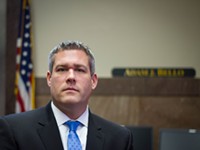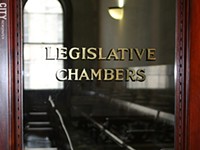POLITICS: The devil in the details
Tax expert David Cay Johnston has another book out. The message in this one: pro-business tax policies are robbing us blind.
By Ron Netsky[
{
"name": "500x250 Ad",
"insertPoint": "5",
"component": "15667920",
"parentWrapperClass": "",
"requiredCountToDisplay": "1"
}
]
You won't hear about it on the news until a disaster happens, but there could be a deteriorating gas pipeline in front of your house or near your kids' school.
With only two local companies offering combined Internet and cable services, you might not be aware of how inferior those systems are — and how much more we pay for them — compared to the price of their French counterparts.
And you probably haven't heard about corporations that withhold state taxes from their workers' paychecks and then keep the money.
Brighton resident David Cay Johnston has discovered a lot of alarming things about the corporations we deal with every day. All of the above and a lot more abuses are exposed in his new book, "The Fine Print: How Big Companies Use 'Plain English' to Rob You Blind." It's his third book in a series that began with "Perfectly Legal" in 2004 and continued with "Free Lunch" in 2007.
In a wide-ranging interview recently, Johnston also discussed the Occupy movement, mall developers who want to take hundreds of millions in taxpayer money to support their business risks, and the emerging American oligarchy, living high on the hog without sharing in the tax burden.
Johnston left the New York Times in 2008 after 40 years of investigative reporting and a Pulitzer Prize. Since then, he's been writing columns for Tax Notes and Reuters, hosting shows on WXXI radio, and teaching at Syracuse University. He's also become the go-to pundit on Mitt Romney's taxes on The Last Word With Lawrence O'Donnell and The Rachel Maddow Show on MSNBC.
"The Fine Print" uncovers information that usually slips under the radar of mainstream reporting. "We are having our pockets picked," says Johnston, "and we are literally paying for rules that enable picking our pockets."
The following is an edited version of our interview with Johnston.
City: What was your purpose in writing "The Fine Print"?
Johnston: I am arguing in all three books for competitive markets. I got where I got — from being in the bottom third of Americans to being comfortable — through competition. Competition is a good thing; it imposes rigor. We're getting away from market competition. We're moving into a society of corporate socialism. I want rules that create the greatest gain with the least drag on society.
We will always have people we're going to have to subsidize and support. Maybe they were born with shortcomings or were the victims of horrible crimes or accidents or illness. You want to have a society where you minimize your losses, but you recognize them and pay for them, because you want social stability.
The object is to make the United States endure, and you don't do that by saying: if you're not rich, too bad. Teddy Roosevelt said, "We will all go up or down together." We've lost sight of that.
We need to have economic rules that reward strivers and don't subsidize people who aren't striving. Yet that's what we're doing. We're taking from the many to give to the few, and we're giving unbridled power to companies, many of which are putting our lives in danger because it's profitable to do so.
One of the most frightening chapters in your book deals with gas pipelines and the very real implications of corporations cutting corners.
I tell the stories of three disastrous pipeline explosions in this country. There are people who have 30-inch natural gas pipelines operating at 1,500 pounds per square inch of pressure running down the street in front of their houses, and they have no idea. The pipeline industry sends brochures to schools and hospitals that are supposed to warn of this danger, and they tell you absolutely nothing useful.
One of them tells you how wonderful the pipeline industry is. All of a sudden the fifth page says you live in a "High Consequence Area." That's a euphemism for zone of almost certain horrible death if something goes wrong. It doesn't say to a school principal, "Here's how to find out where the pipeline near your school is."
The pipeline companies are required to have emergency plans. You have to file freedom of information acts to get these things, and there's nothing in them. They're just boilerplate. If we have a pipeline explosion in Manhattan, it will kill potentially thousands and thousands of people.
You pointed out a dangerous discrepancy in the permit of one company and they just shrugged.
The US Transportation Dept. has been granting "special permits" to pipeline companies exempting them from a 10-year-old law that began inspection of pipelines. I call them safety waivers. I was reading the ones for National Fuel Gas in western New York. As worded, it seemed that you could eat through 80 percent of the pipeline wall and still run the pipeline. They mean 20 percent.
As the pipelines age, the insurance premiums go up because the risks go up. Because the companies are monopolies, they get to include the higher insurance premiums in the rates you pay them so, in essence, you are being charged to pay for the increased risk to your safety.
What effect has corporate arrogance had on the Rochester area?
The single biggest economic barrier to revitalizing the Rochester market is that we do not have, and are not scheduled to get, the information super-highway that we were promised in the 1990's and that we paid for in higher rates for telephone and cable TV services. What happened when nobody was paying attention was the companies got laws passed that allowed them to give us the crappy Internet that we have that's slow and inefficient.
America invented the Internet. It's now 29th in the world in its Internet speed. The triple-play package, cable, phone, and Internet – both Frontier and Time Warner offer them – after the first year, costs about $160 per month with taxes.
In France it costs about $40, and instead of calling for two countries, you get worldwide telephone calling. Instead of domestic TV channels, you get live television from around the world. You get an Internet that's 10 times faster downloading and 20 times faster uploading. We get ripped off. The cable companies put the money from higher rates into profits, and the telephone companies put it into building cellular systems.
In the book, you describe another way people are ripped off through state taxes.
Hundreds of thousands of Americans have state income taxes withheld from their paychecks that never go to the government. They don't know it, because the law doesn't require telling them this. Once the taxes are withheld, the state regards them as having paid their taxes. It then lets the companies they work for keep these taxes.
The 2,700 companies that get this include every brand-name company you know — General Electric, Proctor & Gamble, Ford, Chrysler and a lot of foreign companies like Mitsubishi, Nissan, Deutsche Bank. All have these deals, and they're spreading like wildfire across the country. I believe they'll become close to universal if we don't put a stop to it.
You're having to make up for the workers' taxes the company is pocketing. There is a fundamental drive in this country to turn taxes from public purposes to private profits.
Right now, state and local tax incentives of this kind cost the average American family $900 a year. That is more than the weekly take-home pay of the typical American family with children. They're giving up a week's take-home pay for this corporate welfare.
The Republican leaders here in Monroe County are among the biggest promoters of corporate welfare. They are among the most abusive in helping their friends, I would argue, not by earning money in the marketplace, but through the tax system.
You also use the example of Irondequoit Mall.
That mall, built for $140 million in today's money, sold for about $6 million. [The developer] has asked for $260 million to redo that mall. When I asked the county for its due diligence — will this actually work? — they gave me a report written by the developer's consultants. That's absurd.
Why should everyone in the county put up money to help this private developer? If it's a sound investment, the market will finance it. If it's not a sound development, why should you be forced to pay taxes to finance it? This is not market economics.
People say the Occupy movement didn't amount to much. But it got the idea of 99 percent and 1 percent into our consciousness.
That's exactly what they did. They changed the debate. I went down there and spent a day interviewing people. I met believers and atheists, liberals and Libertarians, Republicans and Democrats, truck drivers and theology professors. It was a broad mix of people, some of whom had been affected directly, some of whom had seen what went on around them, some of whom had family.
People at the very top have, in many cases, untaxed fortunes; they're living lavish lifestyles, and they're contributing little or nothing to the cost of the society that make their riches possible.
The Occupy movement was partially a reaction to the bailouts of 2008. How do you view the bailouts in retrospect?
A lot of Americans wrongly believe that the Wall Street bailout was by the Obama administration. It was not. When the Bush administration bailed out Wall Street, except for the two companies that failed, everybody got 100 cents on the dollar of the money they had at risk.
When Detroit was bailed out by the Obama administration, everybody took what's called a haircut. They lost money. The CEOs and the janitors all took pay cuts. The executives lost about half of their supplemental deferred compensation for their old age.
Look what's happened since then. Wall Street is now back to doing exactly what it did before, paying unbelievable amounts of money for things that are not socially and economically productive — derivatives trading, gambling. The US auto industry is on the mend. General Motors may be the biggest car company in the world again.
Why do you think Romney won't release his tax returns?
I think it's highly likely that Romney paid no or virtually no tax in some years. You'll notice when Romney finally spoke on this he said, "I paid taxes every year for the last ten years." The likely period of no tax payment would have been in the 1990's up to 2002.
If you are the manager of an off-shore fund like Bain Capital Management — and Romney wasn't just the manager, he was the sole owner — you can defer 100 percent of your income. You just put it back into the fund.
You and I, if we have a 401(k), can only save a limited amount of money, but managers of these funds can have an unlimited amount of money, tax-free, build up. Now you go to your banker and say, "I've got $1 billion here; I need so many million to live on this year." The banker can loan it to you so you can live off your borrowed money.
Why does that law exist? Why can they do what we can't?
Carried interest and unlimited deferral for private equity and hedge fund managers is an abomination in the view of every single tax scholar that I know, conservative to liberal. It exists because the people who benefit from these things pour money into political campaigns and, more importantly, say if you don't go along with this we'll pour money into someone to oust you.
That's what the Club for Growth is: the Republican Party's disciplinary shop. You violate its principles on taxes, and they will find another Republican and run you out of office. They've done it many times.
I assume Mitt Romney has passed that test?
Grover Norquist said if Romney is elected what you'll see is Paul Ryan's tax plan. Under Ryan's tax plan we would become like 18th-century France. The only difference is, instead of the church and the inherited nobility controlling all the property, it would be the inheritors of the oligarchs of today. Your economics would depend on how well you picked your parents.
Before reading your book, I'd never heard of ReadyReturn. What is it?
There are roughly 140 million federal tax returns filed each year; 100 million of those are totally unnecessarily. They're filed by people who take the standard deduction, and the government already knows how much money they've got.
In California, they set up a system where the government would send a letter to single people saying, here's your income; here's the tax you owe; if you agree, sign this. If you don't agree, fill out a tax return. The people who took advantage of it, in surveys, said this is the most fantastic government program they'd ever heard of. It got rid of this stupid make-work. You mean I don't have to pay money to Intuit? Oh, there's the problem.
Intuit, the maker of TurboTax, spent $1 million in support of a single California legislator who's affiliated with the Republican Club for Growth and who promised eternal fealty to the goal of Intuit and H&R Block and the others, which is that everybody has to pay them to fill out a tax return or do this terrible work by themselves.
Intuit and Grover Norquist are in common cause here. He says he wants to reduce your tax burden, but he needs people to be angry at the tax system so he wants to maintain tax filing. He says falsely that you wouldn't take all the deductions you're entitled to. ReadyReturn only applies to people who don't get any deductions.
Norquist and the Republican Party want to make the government less efficient because it furthers their political goal of encouraging hatred against the government of the United States of America.
"The Fine Print" offers lots of solutions. You clearly haven't given up on fixing this.
The number of people I meet who feel powerless and say we can't do anything about it — excuse me, we can. Our constitution enshrined slavery; we got rid of it. Six hundred and thirty some thousand Americans had to die, but we got rid of slavery.
Women got the right to vote because men voted to give it to them. More than a century ago, there were preachers fighting against child labor laws, saying it is God's plan that children should work in these factories and if you favor these laws you're an agent of the devil. We got child labor laws.
We've improved our society enormously. If you think we can't solve our problem, what you're saying is the United States has no future. The whole idea of the United States of America is that we can solve our problems. And we can overcome this problem of twisted, excessive, abused power by corporations, which I believe is absolutely at the core of our difficulties. Those ideas are killing our democracy.
Speaking of...
Latest in News
More by Ron Netsky
-

Album Review | 'Bizet: Carmen in Jazz'
Mar 26, 2024 -
'To Swing Is the Thing" by Mike Melito
Aug 10, 2023 - More »









